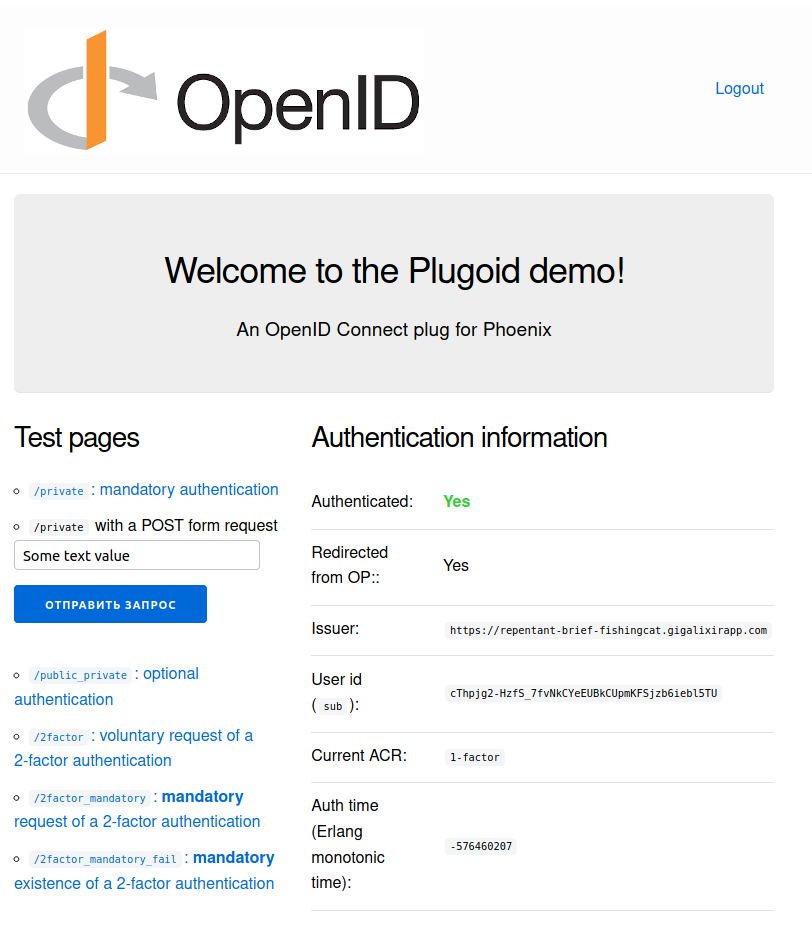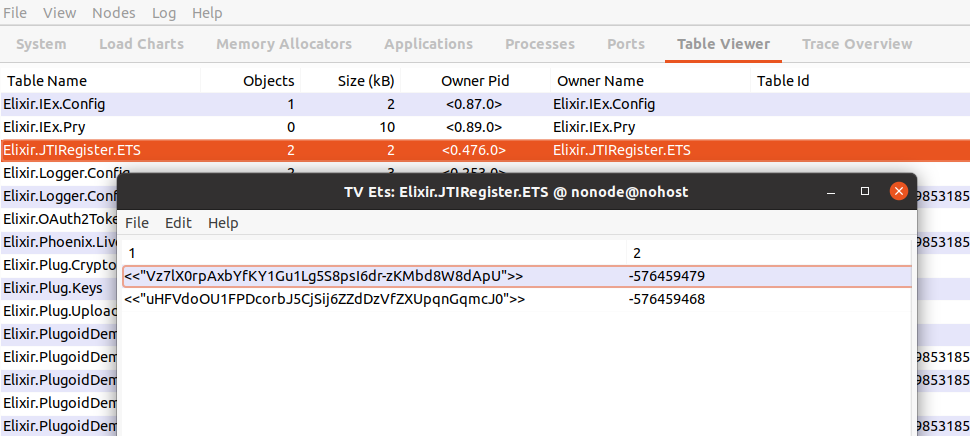Phoenix demo application that uses the Plugoid library
to authenticate users.
OTP 22+
In a shell, launch the following commands:
git clone https://github.com/tanguilp/plugoid_demo.git
cd plugoid_demo/
mix deps.get
cd assets && npm install && node node_modules/webpack/bin/webpack.js --mode development && cd ..
iex -S mix phx.serverand open localhost:4000.
The demo uses https://repentant-brief-fishingcat.gigalixirapp.com/ as an OpenID Provider. It runs the Asteroid OAuth2 / OpenID Connect server.
The first factor is always the 123456 password. The second factor is an OTP code sent by
email. In such a case, you have to use an email address as a login (it is stored but not used
whatsoever). The OTP email will possibily be marked as a spam, check in your spam folder if
you can't see it.
If the server is down (e.g. visiting https://repentant-brief-fishingcat.gigalixirapp.com/.well-known/openid-configuration) results in an error, open an issue on the Asteroid tracker.
To modify the OpenID Connect server, change the issuer in lib/plugoid_demo_web/router.ex.
The first 2 links (/private) use the authorization code flow, and therefore some tokens are
returned.
Using the issuer and subject shown on the demo page, one can use
OAuth2TokenManager library included in the
demo application to retrieve OAuth2 tokens, ID tokens and claims.
For instance:
iex> cc = PlugoidDemo.OpenIDConnect.Client.get("client1")
%{"client_id" => "client1", "client_secret" => "clientpassword1"}
iex> OAuth2TokenManager.AccessToken.get("https://repentant-brief-fishingcat.gigalixirapp.com", "cThpjg2-HzfS_7fvNkCYeEUBkCUpmKFSjzb6iebl5TU", cc, nil)
{:ok, {"mcR_hHPaCTRdb09Mtm4FsIlPyYE", "bearer"}}
iex> OAuth2TokenManager.AccessToken.get("https://repentant-brief-fishingcat.gigalixirapp.com", "cThpjg2-HzfS_7fvNkCYeEUBkCUpmKFSjzb6iebl5TU", cc, ["read_account_information", "read_balance"])
{:ok, {"HjRo0pkxY4LFmCiKNfDT-OLvEwY", "bearer"}}
iex> OAuth2TokenManager.AccessToken.get("https://repentant-brief-fishingcat.gigalixirapp.com", "cThpjg2-HzfS_7fvNkCYeEUBkCUpmKFSjzb6iebl5TU", cc, ["read_account_information"])
{:ok, {"X6o9UDEJEpkp2kr8EA-68toX1Es", "bearer"}}
iex> OAuth2TokenManager.Claims.get_id_token("https://repentant-brief-fishingcat.gigalixirapp.com", "cThpjg2-HzfS_7fvNkCYeEUBkCUpmKFSjzb6iebl5TU")
{:ok,
"eyJhbGciOiJSUzI1NiJ9.eyJhY3IiOiIxLWZhY3RvciIsImFtciI6WyJwd2QiXSwiYXVkIjoiY2xpZW50MSIsImF1dGhfdGltZSI6MTU5MDc4MjQwMSwiZXhwIjoxNTkwNzgyNDYyLCJpYXQiOjE1OTA3ODI0MDIsImlzcyI6Imh0dHBzOi8vcmVwZW50YW50LWJyaWVmLWZpc2hpbmdjYXQuZ2lnYWxpeGlyYXBwLmNvbSIsInN1YiI6ImNUaHBqZzItSHpmU183ZnZOa0NZZUVVQmtDVXBtS0ZTanpiNmllYmw1VFUifQ.LDUDgIntqkAGqpU8UdpQEqFmelCH6q0gJT_mUij-POamcMzoixP-Y1VqVhzPLKlPvontcejgHWA4pJg2FhwcpSWdc27bspil_cGQco0mf2Tzge0JUf88gR3JvqES1bLzRwF40oyQxox0dWh-dh0cf5zhf9vga_rRN3HexmsFwLbFJpudtZzsUdmXYYEjpmjH4Ja9zBjv5-g3g10UGjeFVtAwDv2urK9eyEn2aStUgcmf0yxiyHoyTAa9QPkJ6_3YBIT9s0saKlBV9gUqNp6_ogv6jvLDhMqCkw9xqVfMICeoSjSxc8Uawut6_f-aedLVSNQEKifR0KkUC3D2amPZog"}
iex> OAuth2TokenManager.Claims.get_claims("https://repentant-brief-fishingcat.gigalixirapp.com", "cThpjg2-HzfS_7fvNkCYeEUBkCUpmKFSjzb6iebl5TU", cc)
{:ok, %{"sub" => "cThpjg2-HzfS_7fvNkCYeEUBkCUpmKFSjzb6iebl5TU"}}The JTIRegister.ETS JTI register is
installed by default.
One can observe the registered JTI by opening the observer (:observer.start in the iex shell)
and opening the Elixir.JTIRegister.ETS table in the "Table Viewer" tab:

